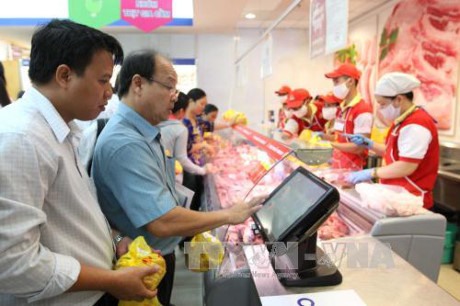 Economy
Economy

A HCM City programme to trace the origin of pork products that began four months ago has not met the expectations of its managers, according to the Department of Industry and Trade.
 |
| A consumer checks the origin of pork sold at a supermarket in HCM City. — VNS Photo |
HCM CITY — A HCM City programme to trace the origin of pork products that began four months ago has not met the expectations of its managers, according to the Department of Industry and Trade.
Under the project, each pig at breeding farms wear two yellow rings with an electronic stamp that records information about the farm and the animal’s breeding process.
Farmers are responsible for activating the QR code on the stamp to start recording the information.
When the pigs are delivered to slaughterhouses, an orange ring will be attached to their containers, recording information about the traders and containers.
When pork is transported to markets, traders will activate another stamp.
At a meeting held in HCM City last week to review the programme, the department reported that while 1,131 pig breeding establishments in eight cities and provinces in the south have registered to participate, only 123 of them put the rings on 297,300 of their pigs.
Only 10 out of 25 abattoirs in HCM City, Đồng Nai, Bình Dương, and Long An who registered to join have activated the code on the rings on pigs.
Huỳnh Tấn Phát, deputy director of the city Department of Animal Health, said that, besides, only 45 per cent of pigs that do wear the rings have them activated by the farmers.
His department is unable to resolve the problem, but in the absence of provisions to deal with violations, it cannot penalise violators but only issue a warning, he said.
Hóc Môn and Bình Điền wholesale markets have taken part in the programme since March. But since April, when pig prices started to fall, traders at the Bình Điền, who bought pigs from Long An Province, have stopped attaching the rings on the animals.
At Hóc Môn too, the number of pigs with the rings has fallen by half, he said.
Some delegates told the meeting that the project faces difficulties because traders buy pigs mainly from small household farmers living in remote areas without the internet or 3G, meaning they cannot activate the tools required to upload details about their pigs.
Nguyễn Ngọc Hòa, deputy director of the Department of Industry and Trade, said 51 per cent of pigs with the rings are from foreign-invested enterprises while households account for just 7 per cent though the city subsidises the cost of the electronic rings by 50 per cent.
Trần Vĩnh Tuyến, deputy chairman of the city People’s Committee, said while controlling and tracing the origin of food products is imperative, authorities need to be patient and have comprehensive measures and a specific roadmap and targets for it.
It is not merely a matter of technology but also requires changing the awareness and habits of farmers and traders, he said.
He instructed the Department of Industry and Trade to work with Viettel and VNPT to install wi-fi stations in remote areas to help farmers easily participate in the project. — VNS




